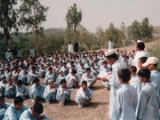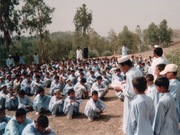
Akora Khattak
Encyclopedia

Pakistan
Pakistan , officially the Islamic Republic of Pakistan is a sovereign state in South Asia. It has a coastline along the Arabian Sea and the Gulf of Oman in the south and is bordered by Afghanistan and Iran in the west, India in the east and China in the far northeast. In the north, Tajikistan...
.
Birthplace of Khushal Khan Khattak
Akora Khattak is the birth place and burial place of the famous poet Khushal Khan KhattakKhushal Khan Khattak
Khushal Khan Khattak was a prominent Pashtun malik, poet, warrior,A charismatic personality and tribal chief of the Khattak tribe. He wrote a huge collection of Pashto poems during the Mughal Empire in the 17th century, and admonished Pashtuns to forsake their divisive tendencies and unite...
. The Khushal Khan Khattak Memorial Library
Khushal Khan Khattak Memorial Library
Khushal Khan Khattak Memorial Library is a public library in Akora Khattak, Pakistan. The library has been constructed in the memory of the famous poet Khushal Khan Khattak, who was born in Akora Khattak. The library was established in 1994...
has been constructed there to commemorate the poet.
Akora Khattak has name on the name of the Malik Akor Khan the grandfather of the great warrior and Pushto poet Khushal Khan Khattak.
Sher Shah Suri Period
When the emperor “Sher Shah Suri’s” army dug two wells in this place and made it a rest place and named the place Sarai Malik Pura. Caravans came from the Central Asia for trading purpose and stayed at this place.
Mughal Period
In 1581 Mughal emperor ‘Jalal-ud-din Muhammad Akbar’ came to Peshawar to finish the mutiny of his brother ‘Mirza Hakeem’ and stayed there for a few years. During this stay he take the meeting (jarga) of all the tribal chiefs for the betterment of the area in the meeting the name of Malik Akor Khan came who was a robber and often robbed the troops on the highway and was living at Neelab (Nizampur) and create problems for the Mughal government. The solution of this problem was thought that king make him a government servant so the king gave him the responsibility of taking toll tax from the caravans on the crossing of the Indus
Indus River
The Indus River is a major river which flows through Pakistan. It also has courses through China and India.Originating in the Tibetan plateau of western China in the vicinity of Lake Mansarovar in Tibet Autonomous Region, the river runs a course through the Ladakh district of Jammu and Kashmir and...
at Attock.
Malik Akor Khan came to the Sarai Malik Pura (Akora Khattak) for this purpose and made this area his living place after some time this place was renamed as ‘Sarai Akor Khattak’ and by the passing of time its name became “Akora Khattak”.
Sikh Period
In 1820 Sikhs of Panjab conquered Peshawar and other Pathan areas and ruled on it up to 1849. In 1826 the Mujahidin-I-islam (Sayed Ahmad Barelvi) fought a battle against Sikhs at this place. In 1834 Sardar lehna Singh built the fort of Akora Khattak near the river Kabul and made Ahmad khan the chief of the fort.
British Period
The British period starts from 29 August 1849. In 1809 the colonial Indian administrator and later Governor Of Bombay, Sir Mount Stewart Elphinstone visited Peshawar.
The cantt. of Akora Khattak was established in 1850 and at 23 March 1851 Lord Dalhousie, Governor-General of India, visited the place.
In 1916 the first police station of Akora Khattak was established.
The railway line went through this area in 1923 and in the same
Dar-ul-Uloom Haqqania
Darralu-me-haqqnia is the second largest most famous mosque in Pakistan which has been well-recognized in all over Asia. More than 8000 students have been receiving knowledge. Khushal Khan KhattakKhushal Khan Khattak
Khushal Khan Khattak was a prominent Pashtun malik, poet, warrior,A charismatic personality and tribal chief of the Khattak tribe. He wrote a huge collection of Pashto poems during the Mughal Empire in the 17th century, and admonished Pashtuns to forsake their divisive tendencies and unite...
library is located here. Many visitors come from the other parts of the country to visit here. The younger generation is fond of playing new games but the most interesting and famous that is played every day is cricket. Akora khattak also provides stronger performance of education. The people of Akora khattak are well-behaved and well-educated. Akora khattak also has the facilities of ladies' education.
The school has been referred to as "the Harvard of the Taliban movement", and is believed to have been the alma mater
Alma mater
Alma mater , pronounced ), was used in ancient Rome as a title for various mother goddesses, especially Ceres or Cybele, and in Christianity for the Virgin Mary.-General term:...
of hundreds of Islamist militants in the region.
Almost 1000 students pass their graduation every year from this university. In the last decade this university has provided hundreds and thousands of islamic militants which include Taliban fighters and suicide bombers in the region. This university is also famous as "The University of holy war".
Dar-ul-Uloom Haqqania receives almost all of its required funding from the Saudi Arabian government or Saudi charities - the main source of financial support for militant Islamic organizations in the region.

